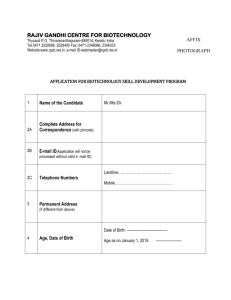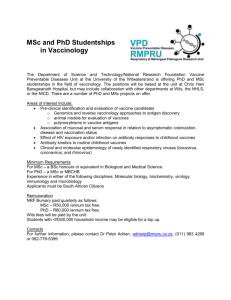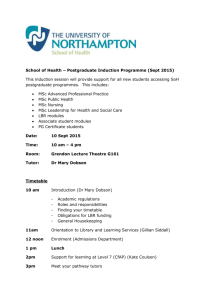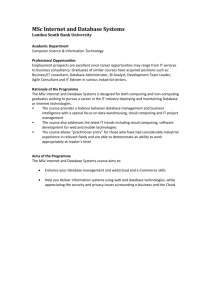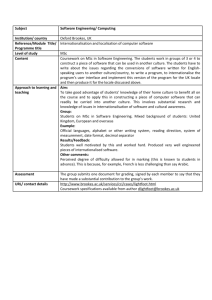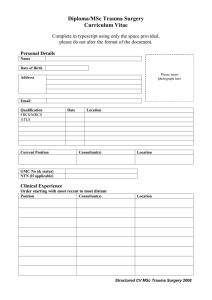Brochure_CAES
advertisement
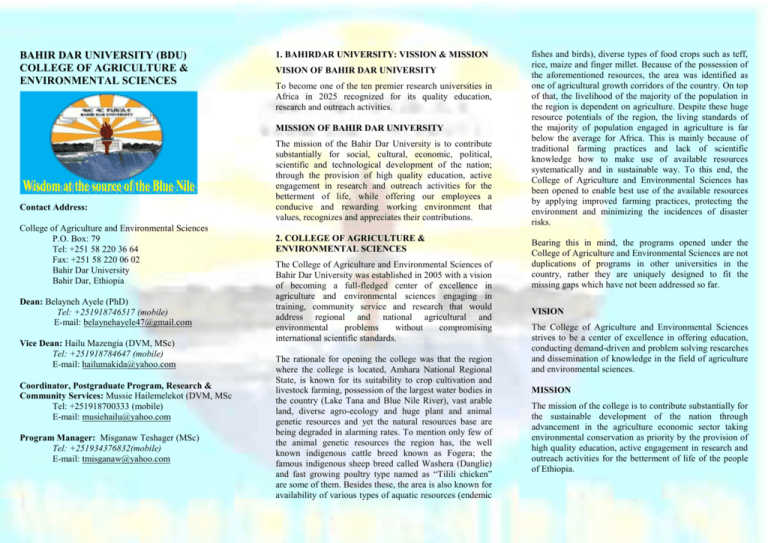
BAHIR DAR UNIVERSITY (BDU) COLLEGE OF AGRICULTURE & ENVIRONMENTAL SCIENCES 1. BAHIRDAR UNIVERSITY: VISSION & MISSION VISION OF BAHIR DAR UNIVERSITY To become one of the ten premier research universities in Africa in 2025 recognized for its quality education, research and outreach activities. MISSION OF BAHIR DAR UNIVERSITY Contact Address: College of Agriculture and Environmental Sciences P.O. Box: 79 Tel: +251 58 220 36 64 Fax: +251 58 220 06 02 Bahir Dar University Bahir Dar, Ethiopia Dean: Belayneh Ayele (PhD) Tel: +251918746517 (mobile) E-mail: belaynehayele47@gmail.com Vice Dean: Hailu Mazengia (DVM, MSc) Tel: +251918784647 (mobile) E-mail: hailumakida@yahoo.com Coordinator, Postgraduate Program, Research & Community Services: Mussie Hailemelekot (DVM, MSc Tel: +251918700333 (mobile) E-mail: musiehailu@yahoo.com Program Manager: Misganaw Teshager (MSc) Tel: +251934376832(mobile) E-mail: tmisganaw@yahoo.com The mission of the Bahir Dar University is to contribute substantially for social, cultural, economic, political, scientific and technological development of the nation; through the provision of high quality education, active engagement in research and outreach activities for the betterment of life, while offering our employees a conducive and rewarding working environment that values, recognizes and appreciates their contributions. 2. COLLEGE OF AGRICULTURE & ENVIRONMENTAL SCIENCES The College of Agriculture and Environmental Sciences of Bahir Dar University was established in 2005 with a vision of becoming a full-fledged center of excellence in agriculture and environmental sciences engaging in training, community service and research that would address regional and national agricultural and environmental problems without compromising international scientific standards. The rationale for opening the college was that the region where the college is located, Amhara National Regional State, is known for its suitability to crop cultivation and livestock farming, possession of the largest water bodies in the country (Lake Tana and Blue Nile River), vast arable land, diverse agro-ecology and huge plant and animal genetic resources and yet the natural resources base are being degraded in alarming rates. To mention only few of the animal genetic resources the region has, the well known indigenous cattle breed known as Fogera; the famous indigenous sheep breed called Washera (Danglie) and fast growing poultry type named as “Tilili chicken” are some of them. Besides these, the area is also known for availability of various types of aquatic resources (endemic fishes and birds), diverse types of food crops such as teff, rice, maize and finger millet. Because of the possession of the aforementioned resources, the area was identified as one of agricultural growth corridors of the country. On top of that, the livelihood of the majority of the population in the region is dependent on agriculture. Despite these huge resource potentials of the region, the living standards of the majority of population engaged in agriculture is far below the average for Africa. This is mainly because of traditional farming practices and lack of scientific knowledge how to make use of available resources systematically and in sustainable way. To this end, the College of Agriculture and Environmental Sciences has been opened to enable best use of the available resources by applying improved farming practices, protecting the environment and minimizing the incidences of disaster risks. Bearing this in mind, the programs opened under the College of Agriculture and Environmental Sciences are not duplications of programs in other universities in the country, rather they are uniquely designed to fit the missing gaps which have not been addressed so far. VISION The College of Agriculture and Environmental Sciences strives to be a center of excellence in offering education, conducting demand-driven and problem solving researches and dissemination of knowledge in the field of agriculture and environmental sciences. MISSION The mission of the college is to contribute substantially for the sustainable development of the nation through advancement in the agriculture economic sector taking environmental conservation as priority by the provision of high quality education, active engagement in research and outreach activities for the betterment of life of the people of Ethiopia. OBJECTIVES OF THE COLLEGE I. To train qualified professionals in various disciplines related to agriculture & environmental sciences so as to raise the agricultural skill and knowledge base and satisfy the trained manpower demand of the nation. To carry out research focused on solving the national agricultural and environmental problems so as to contribute to increasing production and productivity, protection and management of natural resources and improving the livelihood of the population by introducing adaptable and appropriate agricultural technologies and management practices. To provide advisory and consultancy services for governmental and non-governmental organizations concerned with environment, agriculture and natural resources. To develop knowledge and skills in improving the productivity and livelihood of the country by considering the nature and context of environmental hazards such as drought, flooding, land sliding, pest infestation and epidemics. To enable students engage themselves in all aspects of the disaster cycle of risk management including the ability to coordinate and mainstream relevant cross-cutting issues such as gender, age, disability, poverty, HIV/AIDS and environmental issues in the disaster risk reduction efforts. To provide outreach services to the smallholder farming communities, pastoralists, investors and agro-pastoralists in the country. 3. PROGRAMS OF THE COLLEGE The college currently provides undergraduate degree in regular, extension, summer and distance programs with duration of three, four, five and four years, respectively. The college has also post-graduate studies in regular and summer programs. Besides, the college is offering BSc training to students from Benshangul Gumez Region and MSc course for students from Somalia Region in Disaster Risk Management and Sustainable Development UNDERGRADUATE PROGRAMS 1. Animal Production and Technology 2. Disaster Risk Management and Sustainable Development 3. Fisheries, Wetlands and Wildlife Management 4. Natural Resources Management 5. Plant Science 6. Rural Development 7. Water Resources and Irrigation Management 8. BSc in Agricultural Economics 9. BSc in Mid-Career Agricultural Extension 10. BVSc in veterinary Sceince II. POSTGRADUATE PROGRAMS 1. 2. 3. 4. 5. 6. 7. 8. MSc in Agronomy MSc in Plant Breeding MSc in Plant Protection MSc in Horticulture MSc in Animal Genetics and Breeding MSc in Animal Production MSc in Apiculture MSc in Disaster Risk Management and Sustainable Development 9. MSc in Fisheries and Wetlands Management 10. MSc in Land Resources Management 11. PhD in Agronomy c) Fisheries management and aquaculture d) Disaster risk reduction 5. LINKS The college has established links with the following institutions to undertake the education and research activities: 6. III. PROGRAMS TO BE LAUNCHED SOON 1. 2. 3. 4. 5. PhD in Fisheries (curriculum approved by the senate) PhD in Plant Breeding PhD in Soil Science MSc in Tropical Feeds and Animal Nutrition BSc in Environmental Science 4. THE RESEARCH THEMATIC AREA The college has identified four major thematic research areas: a) Food security and livelihood b) Natural resource management 2 The University of Arizona (US), University of Jaume I (Spain), World Agro-forestry Centre, SASAKAWA Africa Fund for Extension Education DCG of Norway, ICRI, IWMI/ILRI VLIR-Belgium and Ghent University, Wageningen International, the Netherlands, University of Cape Town, South Africa, NCCR-North-South Switzerland and; Local institutions such as Amhara Region Agriculture Research Institute (ARARI), Amhara Region Bureau of Agriculture, Rural Capacity Building Project (RCBP) of the Ministry of Agriculture and more others. FUTURE STRATEGIC PLAN In the near future, in line with the strategic plan of the university, the college plans to open more master and PhD programs and to involve primarily in research activities and community services. To this end the college, in its new campus, is determined to put in place research infrastructures such as modern laboratories, digital library, ICT, farms and demonstration sites.
